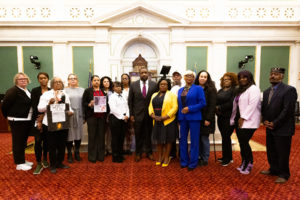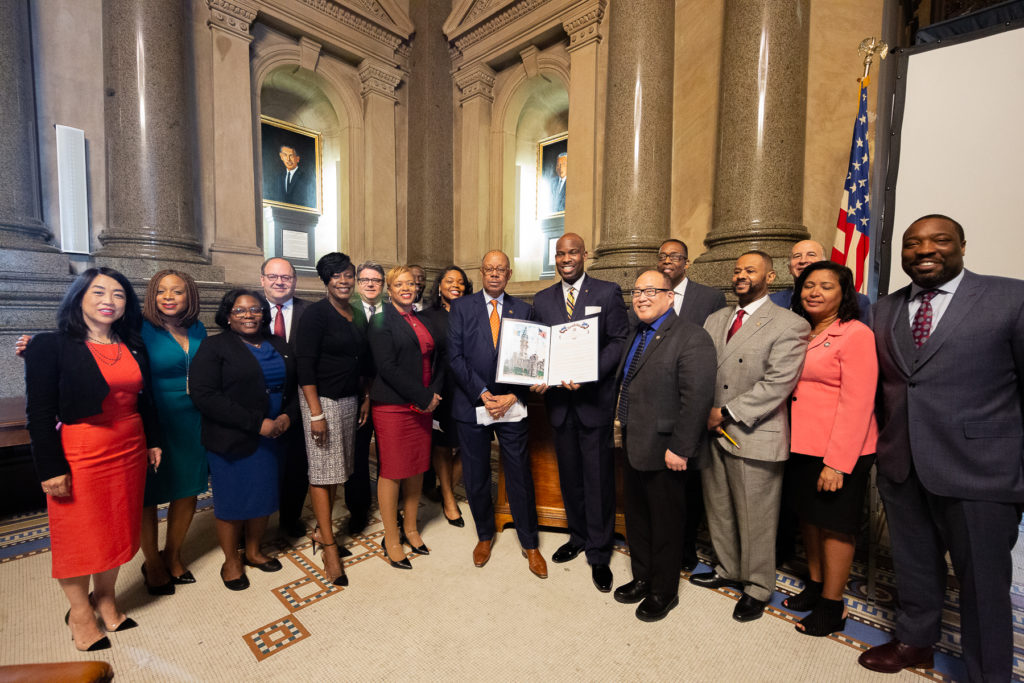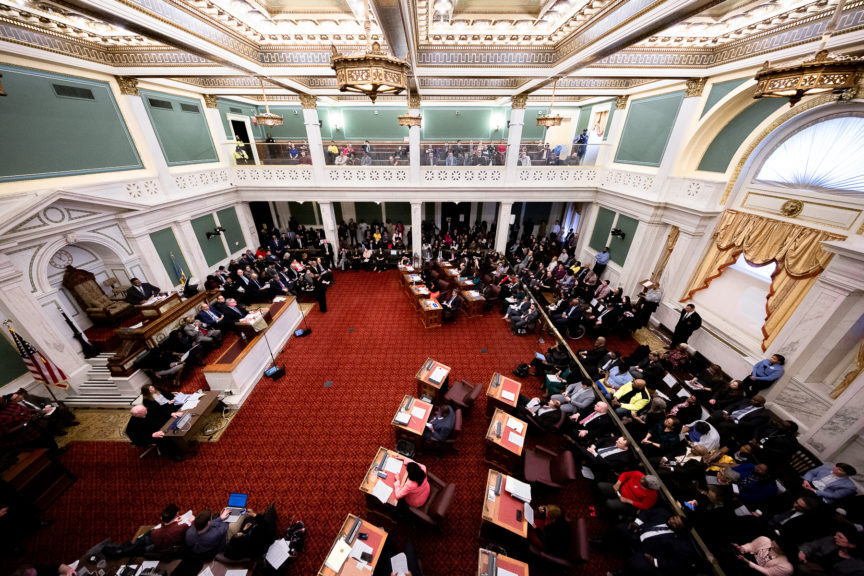 City Council Committee Unveils Action Plan to Lift 100,000 Philadelphians Out of Poverty by 2024
City Council Committee Unveils Action Plan to Lift 100,000 Philadelphians Out of Poverty by 2024
Nearly 400,000 people living in poverty – one out of every four Philadelphians. A designation as the poorest big city in America. City Council had seen enough.
Earlier this week, following a year of work (with more to follow), the Special Council Committee on Poverty Reduction and Prevention unveiled its Philadelphia Poverty Action Plan – a 14-page document filled with actionable strategies to achieve a clear, defined goal: Lifting 100,000 people out of poverty over the next four years.
Surrounded by multiple members of Council, Mayor Jim Kenney, leaders from the city’s business, philanthropic, and non-profit community and state legislators, Council President Darrell Clarke (5th District) and Councilmember Maria Quiñones Sánchez (7th District) laid out the Poverty Action Plan’s vision for Philadelphia.
“This call to action and our report calls for direct investments in people – not programs,” Quiñones Sánchez said. “We are here talking about rent subsidies that mean cash to help pay the rent. Basic income subsidies that help pay the bills. Training stipends that help pay for classes, so that family members can afford the leap from poverty-wage jobs to family-sustaining careers.”
Council President Clarke conceived the comprehensive anti-poverty effort last year, as the city’s high poverty rate of over 24 percent persisted. After Council surveyed national best practices on poverty reduction in an initial report, Narrowing the Gap, the Council President commissioned a Special Committee and tapped Councilmember Quiñones Sánchez, a longtime anti-poverty advocate, to lead it. Other co-chairs included Councilmember Allan Domb (At Large), Sharmain Matlock-Turner of the Urban Affairs Coalition, Mel Wells of One Day At A Time, and Eva Gladstein of the Kenney administration.
The special panel conducted hearings across the city, hearing from residents on best ideas to reduce poverty, produced a substantive report detailing the most actionable strategies, and unveiled them Tuesday at a news conference in Council chambers.
Those strategies include:
Wage tax refunds for low-income workers; improved access to federal and state benefits; a basic income subsidy to help transition families out of poverty; rent subsidies for renters; a one-stop shop for property tax relief for homeowners; expanding community schools with programs focused on job skills; and job training stipends with tuition and living supports to make career education affordable and lift adults from poverty-wage jobs to family-sustaining jobs.
As Councilmember Domb, whose wage tax refund bill is on the mayor’s desk, said: “We should not be filling the city’s coffers on the backs of people earning poverty wages. We should be putting their hard-earned money back into their pockets to help them thrive.”
Council President Clarke, echoing the shared enterprise that the country displayed in the 1960s to put a man on the moon, calls the Poverty Action Plan “the city’s Moonshot moment.”
Clarke and Quiñones Sánchez said price-tags for the anti-poverty strategies would come during the city’s budget process, which got underway Thursday with the delivery of the Mayor’s Budget Address in Council.
Council’s Reactions to Mayor Kenney’s Fiscal 2021 Budget Proposal
Yesterday in Council, Mayor Kenney delivered his fifth budget address, as he spoke on his administration’s $5.2 Billion FY2021 budget, submitted to Council yesterday.
Key highlights of the Mayor’s budget proposal include a $45 Million funding increase for public schools, a new investment of $63 Million for free tuition for up to 6,500 students at the Community College, and no new city taxes.
“Overall, we believe this is a fairly good budget and Five-Year plan, assuming we don’t face any challenges beyond our control,” said Council President Clarke. “Our key focus will be on efforts that lift 100,000 people out of poverty and end our rank as the poorest big city in the country.”
There was other positive reaction in Council to the mayor’s budget address.
“I thank the Mayor for highlighting the need to decrease poverty, creating a safer and more just city, providing quality education for all, cleaner and safer streets, inclusive and resilient neighborhoods and creating a more diverse, efficient and effective Government.” said Councilmember Katherine Gilmore Richardson (At Large) in a statement. “I’m encouraged by the increased investments in public education, PHL PreK and a bold new investment in Community College of Philadelphia.”
“Happy to experience my first @PhillyMayor budget address today,” tweeted Councilmember Isaiah Thomas, another freshman At Large member. “I look forward to working with my colleagues on @PHLCouncil to ensure a safe, promising future for our children.”
Happy to experience my first @PhillyMayor budget address, today. I look forward to working with my colleagues of @PHLCouncil to ensure a safe & promising future for our children pic.twitter.com/8sHO0nEyfY
— Council Member Isaiah Thomas (@CMThomasPHL) March 5, 2020
Clarke said in a statement that he anticipated many discussions during the upcoming budget hearings about how best to integrate the Kenney administration’s ideas on reducing poverty with the strategies contained in Council’s Poverty Action Plan.
The budget hearings begin Monday, March 23rd.
Safe Injection Site Controversy Looms Over Budget Address in Council
On the March day each year when a mayor introduces his proposed budget in Council, generally all other issues facing Council are put aside for a day.
Not this year. The controversy over whether Philadelphia should support a “safe injections site” to allow people addicted to narcotics to inject drugs in a licensed facility with attending medical personnel spilled over into today’s Council session and delayed Mayor Kenney’s budget address by over an hour.
First, a series of public speakers testified on a Council resolution opposing safe injection sites. Largely from South Philadelphia, those speakers strongly opposed the site.
Next, Council members staged an impassioned debate on the pros and cons of safe injection sites. Councilmembers Mark Squilla (First District) and Kenyatta Johnson (2nd District), whose districts straddle the Broad Street location where a site was planned – and then abandoned in the face of community opposition – spoke out against the site, and again questioned the lack of any public input into the site location.
Then, Councilmembers Kendra Brooks and Helen Gym (both At Large) publicly supported the idea of safe injection sites, saying they were needed in a city struggling with more than 1,200 overdose deaths each year. “You cannot detox if you are dead,” Councilmember Gym noted pointedly.
My full statement on the resolution today. pic.twitter.com/1LpaDBqYP1
— Councilmember Kendra Brooks (@KendraPHL) March 5, 2020
Council then voted on a resolution offered by Councilmember David Oh (At Large), that criticized the site rollout, and urged that no further siting move forward until further hearings are held. The resolution was approved, 15-2.
During his budget address, Mayor Kenney made clear where he stands on the issue. “While I understand some of you disagree with the policy, and have concerns with how and when community members were consulted,” Kenney said, “we will continue to work with advocates to support opening overdose prevention sites to save lives and help connect people to treatment.”
Other Action in Council This Week …
Mayor Kenney delivered a Resolution to Council re-appointing eight members of the city’s first locally-controlled School Board in many years, and appointing a ninth, new member.
The appointments, subject to Council confirmation, are:
|
|
The new appointment is Ameen Akbar, a graduate of city public schools who has worked for more than a decade in charter schools, providing case management and mentoring opportunities to youths. He also coaches youth sports as well.
 Councilmember Johnson also introduced legislation to change the Home Rule Charter to create an Office of Victim Advocate, a position that would focus exclusively on victims and survivors of crime and gun violence.
Councilmember Johnson also introduced legislation to change the Home Rule Charter to create an Office of Victim Advocate, a position that would focus exclusively on victims and survivors of crime and gun violence.
Johnson held a press conference earlier this week to announce the legislation alongside victims advocates including including Dr. Dorothy Johnson-Speight, founder and National Executive Director of Mothers In Charge; Aleida Garcia, co-founder of National Homicide Justice Alliance; and Chantay Love, program director of Every Murder is Real Healing Center.
If the legislation is approved by Council, a yes or no question regarding the Office of victim Advocate of the will appear on voting ballots in the November election.
Inside the Rail …
 First noted in this space a few weeks ago, the final departure of city Commerce Director Harold T. Epps received the formal attention of Council today during its weekly caucus, as Councilmember Derek Green (At Large) presented a resolution to the highly-regarded departing commerce leader, affectionately known as “H.T.E.” around City Hall.
First noted in this space a few weeks ago, the final departure of city Commerce Director Harold T. Epps received the formal attention of Council today during its weekly caucus, as Councilmember Derek Green (At Large) presented a resolution to the highly-regarded departing commerce leader, affectionately known as “H.T.E.” around City Hall.
Epps, a longtime business community leader who joined Mayor Kenney as his first Commerce Director in 2016, is retiring from city service today.
Congratulations, Harold. The staff of the Weekly Report thanks you for your service to our city.
The next Stated Meeting of City Council will take place on Thursday, March 12th, at 10 a.m. in Council’s chamber on the 4th floor at City Hall.
# # #


